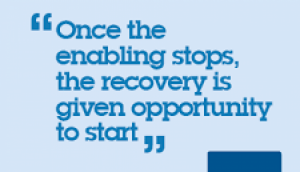Articles On Drug Addiction and Recovery
Enabling an Addict
Addiction can have extremely painful consequences for an addict: destruction of relationships, loss of career prospects, and even death. As their priorities shift an
d the substance becomes increasingly important to them, they may neglect even the most basic of their needs like nutrition and hygiene. For those who knew and loved the addict before the addiction took over – especially parents who have always protected and fulfilled the needs of their son or daughter – it is nearly impossible to passively watch this downward spiral without trying to cushion the fall. Family and friends with good intentions try to protect the addict from negative external consequences. However, in doing so, they help the addict maintain an existence that, no matter how horrible it may seem to an observer, is satisfactory to them instead of helping them find a drug rehab program.
 There are many ways a person may be enabling an addict, some of which are not completely obvious. Certainly, giving money that goes directly or indirectly to addiction is a form of enabling. This includes providing money that is used on rent, groceries, transportation, and clothing when the addict’s own resources are being put toward addiction. But even leaving money in places the addict may find it and steal it could be considered enabling. Although you haven’t technically given your permission, making money available to someone who has had such a serious shift in priorities – and not confronting or prosecuting them for behavior that would not be acceptable in the real world – is as much your problem as addiction is theirs.
There are many ways a person may be enabling an addict, some of which are not completely obvious. Certainly, giving money that goes directly or indirectly to addiction is a form of enabling. This includes providing money that is used on rent, groceries, transportation, and clothing when the addict’s own resources are being put toward addiction. But even leaving money in places the addict may find it and steal it could be considered enabling. Although you haven’t technically given your permission, making money available to someone who has had such a serious shift in priorities – and not confronting or prosecuting them for behavior that would not be acceptable in the real world – is as much your problem as addiction is theirs.
Ultimately, addicts are responsible for the decisions that they make. If you, your wallet, your home, your car, your refrigerator, your bail money, and your excuses for their boss didn’t exist, they would be forced to confront the external consequences of what often develops as a result of an internal problem. These enabling behaviors often delay an addict’s decision to seek a drug treatment center because, if they have help living a life of addiction, why should they make an effort to change? If you genuinely want to help a loved one recover from addiction, you need to assess your own role honestly.

 There are many ways a person may be enabling an addict, some of which are not completely obvious. Certainly, giving money that goes directly or indirectly to addiction is a form of enabling. This includes providing money that is used on rent, groceries, transportation, and clothing when the addict’s own resources are being put toward addiction. But even leaving money in places the addict may find it and steal it could be considered enabling. Although you haven’t technically given your permission, making money available to someone who has had such a serious shift in priorities – and not confronting or prosecuting them for behavior that would not be acceptable in the real world – is as much your problem as addiction is theirs.
There are many ways a person may be enabling an addict, some of which are not completely obvious. Certainly, giving money that goes directly or indirectly to addiction is a form of enabling. This includes providing money that is used on rent, groceries, transportation, and clothing when the addict’s own resources are being put toward addiction. But even leaving money in places the addict may find it and steal it could be considered enabling. Although you haven’t technically given your permission, making money available to someone who has had such a serious shift in priorities – and not confronting or prosecuting them for behavior that would not be acceptable in the real world – is as much your problem as addiction is theirs.